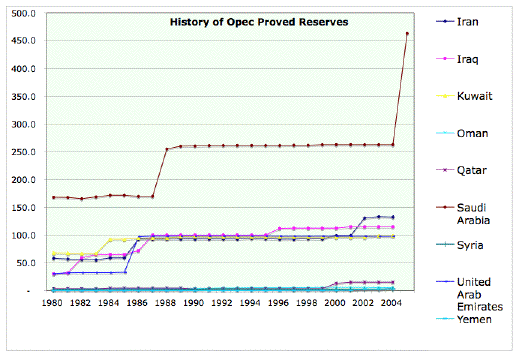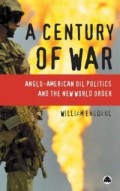State Of Fear
Posted by Big Gav
RealClimate has an article on dominionist US Senator James Inhofe, who is whiling away his time waiting for the Rapture to take him off to heaven by trotting out paranoid science fiction writer Michael Crichton to explain his conspiracy theories about evil climate scientists trying to destroy western industry (not to mention the profits of oil and coal companies) to the US Senate. Perhaps he could get one of the more paranoid abiotic oil theorists to lecture the Senators on the promise of abiotic oil next ? But they probably don't produce enough footnotes on their works of fiction.
Today we witnessed a rather curious event in the US Senate. Possibly for the first time ever, a chair of a Senate committee, one Senator James Inhofe (R-Oklahoma), invited a science fiction writer to advise the committee (Environment and Public Works), on science facts - in this case, the facts behind climate change. The author in question? None other than our old friend, Michael Crichton whom we've had reason to mention before (see here and here). The committee's ranking member, Senator James Jeffords (I) of Vermont, was clearly not impressed. Joining Crichton on climate change issues was William Gray of hurricane forecasting fame, Richard Benedick (a negotiator on the Montreal Protocol on ozone-depleting chemicals), and David Sandalow (NCSE). As might be expected, we paid a fair bit of attention to the scientific (and not-so-scientific) points made.
Many of the 'usual suspects' of half-truths and red herrings were put forth variously by Crichton, Gray, and Inhofe over the course of the hearing:
* the claim that scientists were proclaiming an imminent ice age in the 1970s (no, they weren't),
* the claim that the 1940s to 1970s cooling in the northern hemisphere disproves global warming (no, it doesn't),
* the claim that important pieces of the science have not been independently reproduced (yes, they have),
* the claim that global climate models can't reproduce past climate change (yes, they can)
* the claim that climate can't be predicted because weather is chaotic (wrong...)
and so on.
...
Others panelists attempted to combat the onslaught of disinformation. Sandalow sensibly suggested that the National Academy of Sciences be used to inform the Senate on where the consensus of the science is, and Benedick made some excellent points about how legislation can be successful in the face of scientific controversy and uncertain predictions. However, none of that provided as good theater as the other witnesses.
A highlight of the session was Gray making one particular statement that he may be asked to defend (at least financially): "I'll take on any scientist in this field .... I predict that in 5 to 8 years the globe will begin to cool" (1:10:00 on the video). This would appear to be a direct call to those "global warmers" (see also here, here and here) who are trying to get contrarians to put their money where their mouths are (with very limited success). We eagerly await developments!
Inhofe ended the hearing by declaring his desire to 'sit back and look at [this] in a non-scientific way'. We think he already has.
Crikey today notes that the Murdoch press here is trying to run the same line here as the Inhofe / Crichton cabal is in Washington - clearly the mountain of evidence (in the form of melting polar ice caps, disappearing glaciers, ever more frequent droughts and increasing tropical storm intensity) is beginning to rattle the fossil fuel lobby so they are sending out the corporatist press to perform some delaying tactics.
The problem for those who want to deal with the problem rather than remaining deliberately (and profitably) mired in denial is that as media concentration increases, and becomes ever more aligned with the narrow interests of a group of very large corporations, it becomes ever more difficult to obtain the necessary concensus to take action.
Ex PM Paul Keating (they are coming out of the woodwork this week - while the aging Bodgie has been doing his PR work for the nuclear industry Malcolm Fraser has also popped up to work on getting some judicial oversight laws put in place to try and soften the impact of our harsh new detention without charge laws) has had an op-ed piece published in most of the major papers here warning of the danger to democracy of further restricing the number of media owners in the country. My view is to give them up as a dead loss and rely on the internet for your information - you might as well read an edition of Pravda from 1980 as the Murdoch press if you want something free of propaganda.
Crikey's comment on Keating's article:
Keating exposes the government's recipe for massive media concentration
Former prime minister Paul Keating lobbed an unsolicited op-ed piece in to The Australian, The Age and The Sydney Morning Herald late yesterday afternoon – and by this morning several hundred thousand Australians were finally alerted to the threat to democracy posed by the federal government's proposed changes to media regulation.
As Keating wrote in his story:
"The Government's apparent decision to close down any option for new free-to-air television outlets or multiple channels while removing the existing cross-media laws and foreign ownership restrictions is a recipe for massive media concentration and further abuses of power by the existing network owners."
"Such a change would see the potential for the greatest and most unseemly concentration of media in Australia's history. And if people think they have seen exercises in media power already, it will be as nothing like it may be should these two corporations have their way unfettered."
"The simple point is that John Howard does not have to do this. The pressure for this comes only from Publishing and Broadcasting, News Limited and the loitering Fairfax."
"Proposed policy changes of this kind are always sold on phoney arguments and an almighty sleight of hand. The phoney argument goes to how digital convergence is changing traditional media and communications and how in the technical determinism of it, as night follows day, traditional print and television companies ought be permitted to merge."
"Nobody should be seeking obscurantist curbs on the proliferation of communication channels and media whether of the Blackberry variety or more cable channels. But there is a cut and dried case with nought to do with convergence in respect of the big traditional print and TV outlets."
"What is proposed is a bit of dirty home-town play for the principal benefit of the major incumbents. In practice, were these changes to come about, ordinary bods would need the Packer and Murdoch organisations to stamp their passports for their free movement through Australian society. Not as dire as in the days of the Völkischer Beobachter but heading in that direction."
CRIKEY: Let the debate and the opposition begin – for the sake of Australian democracy.
I bring this up because the Murdoch press has been very active in denying global warming - Crikey outlines the tag team act of troglodyte columnists Andrew Bolt and Piers Akerman as they try to convince the public that all the scientific evidence (along with the water restrictions they face) is wrong.
One of the key results of proposed changes to cross media ownership laws will be the concentration of more political power in the hands of Rupert Murdoch and his duo of attack-dog columnists, Andrew Bolt in Melbourne's Herald Sun and Piers Akerman in The Daily Telegraph.
When the big issues break the Bolt-Akerman pincer movement can often be relied upon to run the same line for their combined 2,717,000 readers in their Sydney and Melbourne tabloids – arguments that, coincidentally no doubt, reflect Rupert Murdoch's own political views and empire-building objectives. Take a look a few recent examples of the Bolt/Ackerman pincer movement in action:
Kyoto Protocol
AKERMAN (17 February): “Only the Greens and the blinkered premier of NSW could have celebrated the enforcement of the meaningless Kyoto Protocol on gas emissions yesterday... The Greens and Mr Carr seem to take their information on climate change from Hollywood scripts and dubious modelling from committed environmentalist think-tanks rather than from the informed consensus.”
BOLT (18 February): “ …. Professor John Christy of the University of Alabama in Huntsville, asks “Will increases in carbon dioxide affect the climate significantly? Are significant changes occurring now? Climate models suggest the answer is yes. Real data suggests otherwise... This is why Lindzen calls the Kyoto accord, which demands expensive cuts to our emissions, ‘absurd'. But so much is absurd in the global warming hysteria, not least the media's willing surrender of its reason.”
Global Warming
BOLT (September 28): “How did Flannery come to write such stuff? Is it because he didn't care enough to check? Or because he – like so many now – thinks the truth isn't sacred when the world needs/saving from wicked humans? Whatever. We are in danger when myths rule men's minds. You should be scared when even a Flannery seems to lose his reason to our new green gods.”
AKERMAN (September 29): “Museum curator Tim 'Calamity' Flannery has been hitting the headlines hard with predictions of the end of civilisation as we know it as he promotes his new disaster tome The Weather Makers. However, with just as much certainty, a plethora of meteorologists have deluged the airwaves with their view that nothing out of the ordinary is taking place... The doomsday predictions are the mantra of the world's newest quasi-religion, environmentalism, and, like converts everywhere, those newly born into Gaia's flock aren't worried about the facts because they have the faith and conviction."
It's amazing just how bald-faced these pampered clowns are in their distortions of reality. Can any of these outrageous claims be backed up ? I think any reasonable person knows the answer - even the big investment banks (not to mention the Pentagon and the insurance industry) have been analysing what is going to happen as global warming gathers strength.
Moving on from the problem of the media (which can hopefully be cured by the surge in distributed news and entertainment content generation), the other problem is the political system. None of the major parties are remotely appealing these days (just ask anyone under the age of 30) - socialism is dead, liberalism is under siege (and doesn't have a party of its own) and conservatism has degenerated into a cesspool of fascism and religious fundamentalism.
One News Ltd journo was quoted in Crikey echoing the call for Malcolm Turnbull to set up a new centrist party, which I'll second - its time for a change. He also cheekily suggests ex Labor leader Mark Latham shoud be part of it after his recent bout of truth telling, which appeals to my sense of mischief making. I'd add Peter Garrett, John Hewson, Petro Georgiou, Natasha Stott-Despoja and even maverick Barnaby Joyce to the mix - anything to disrupt the current status quo.
And with a bit of luck we might even be able to get some action on the key issues of the day - peak oil (and pulling out of Iraq), global warming and turning away from the politics of fear.
A News Ltd journalist writes:
As a political journalist, albeit one based in a regional centre, I wholeheartedly agree with Stephen Mayne's glowing review of The Latham Diaries. The bile and salacious gossip most newspapers ran with after its release betrayed the bigger picture of the book. Latham's insight into his former party, parliamentary life and the media were gobsmacking and invaluable to a relative newcomer to the game like myself. Crikey deserves credit for providing the most comprehensive critique of the book. As for Christian Kerr's challenge to Malcolm Turnbull to start his own party ... I say bring back the Boof (Latham) so he and Turnbull can spearhead a fresh and robust alternative in the political arena. I'd vote for a party like that.





 Elsewhere on WorldChanging they have an item on a new design for capturing tidal energy - the "
Elsewhere on WorldChanging they have an item on a new design for capturing tidal energy - the " Moving back to peak oil (and leaving aside the more conspiracy focussed discussion groups) the most noticeable intersection of the NWO meme with the peak oil meme is the work of
Moving back to peak oil (and leaving aside the more conspiracy focussed discussion groups) the most noticeable intersection of the NWO meme with the peak oil meme is the work of 





